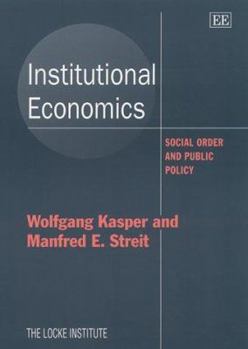Institutional Economics: Social Order and Public Policy
This major book provides an accessible introduction to the burgeoning discipline of institutional economics, and to the central issues of private property rights and their competitive use. The book develops the issue from fundamental premises about human cognition and motivation. It includes policy-oriented discussions of:
the logical basis of institutions and why institutions matterthe institutional arrangements underpinning domestic markets and international exchange where human action is coordinated by private choicethe institutional arrangements underpinning business organizationsthe functions of government and the relative merits of private and public choice, as well as solutions to controlling the opportunistic use of political powerpossible reforms in heavily regulated mature economies that have to meet the challenge from new competitorsthe reasons for the collapse of the socialist institutional systemthe influence of globalization on institutional development during the modernization process in third-world countries
This text breaks new ground in that it summarises the contemporary institutional literature in a cohesive manner.
The book will not only be welcomed by the student of economics but will also be essential to jurists, business managers, anthropologists, sociologists, political scientists, social historians and moral philosophers.





